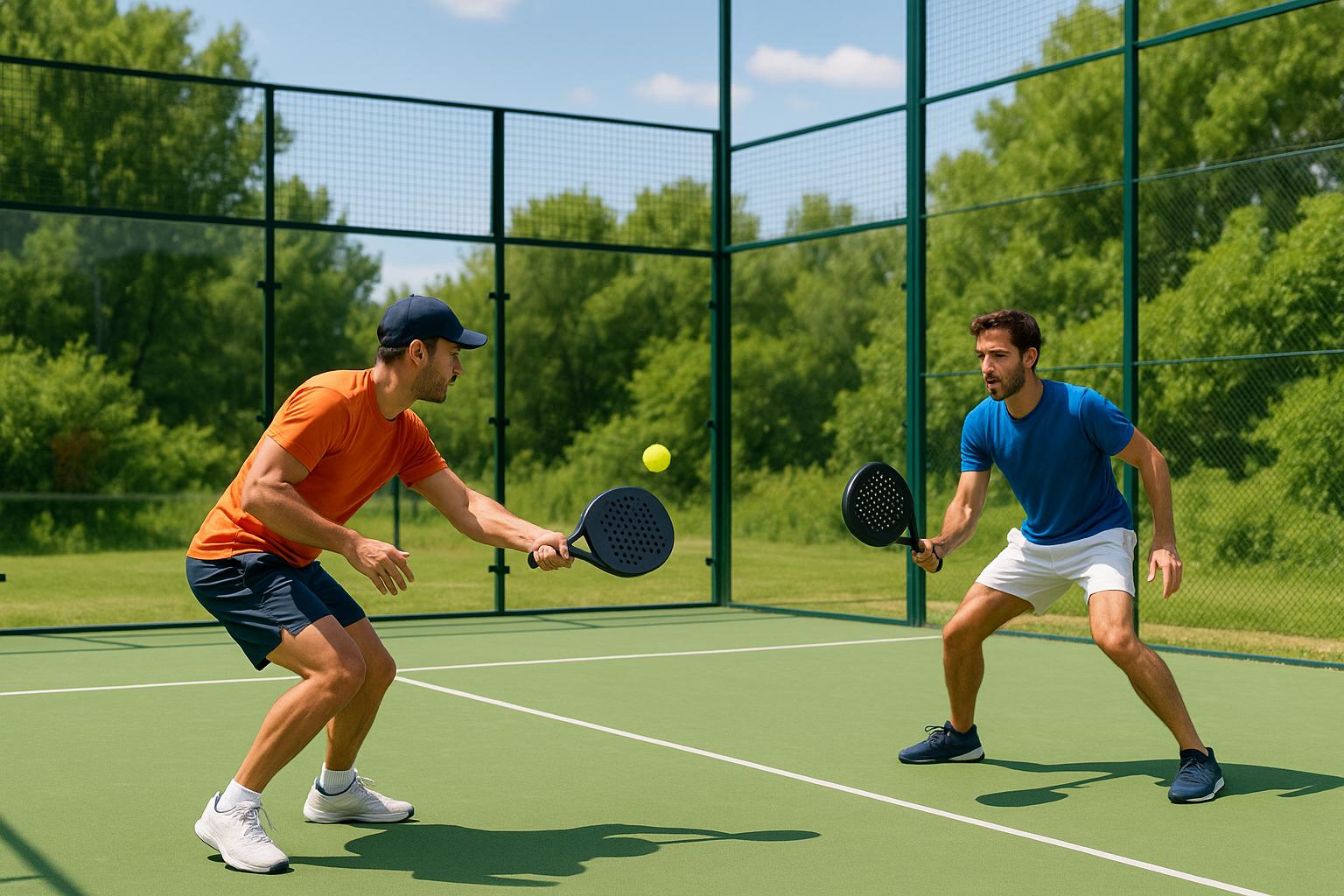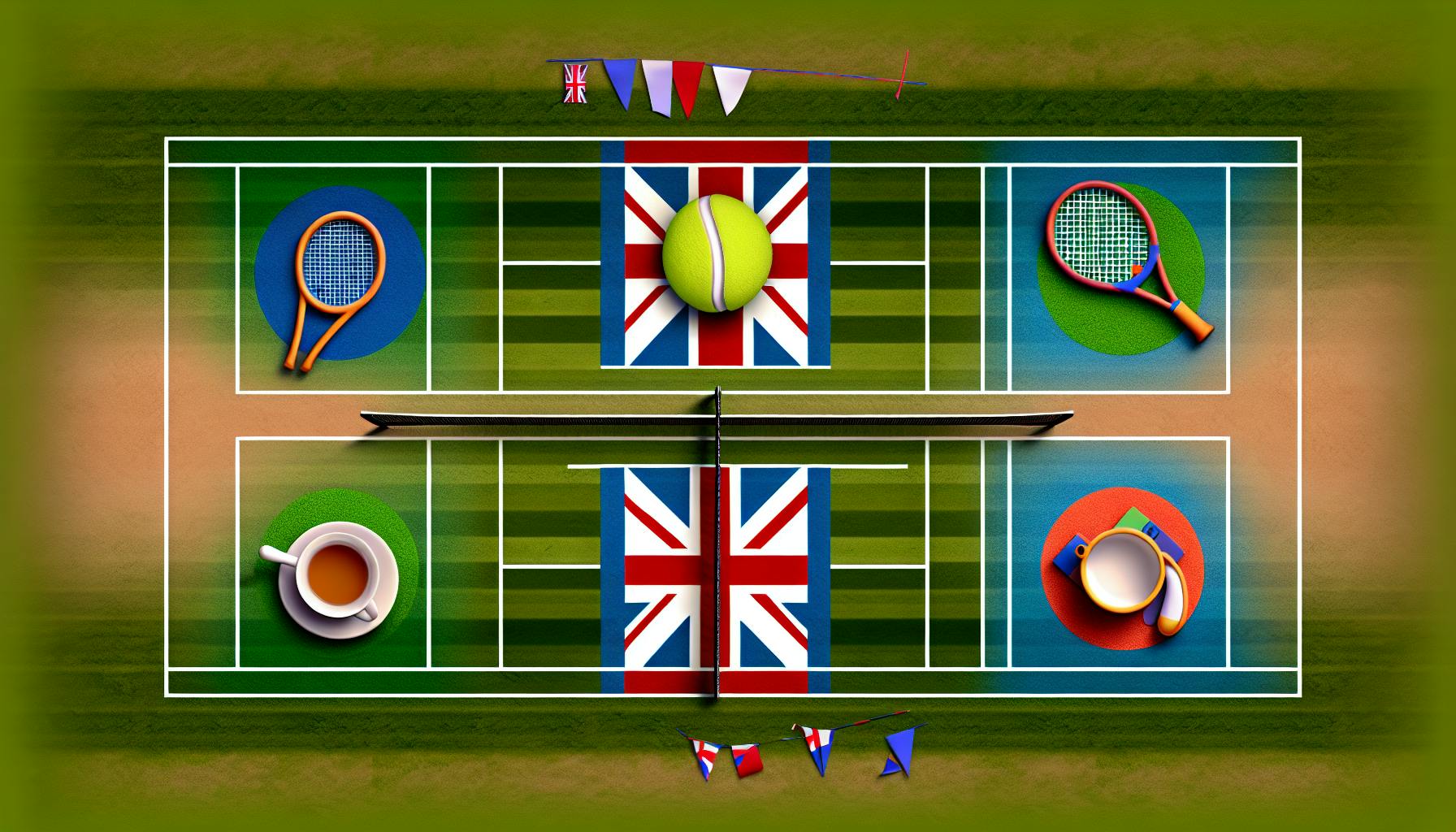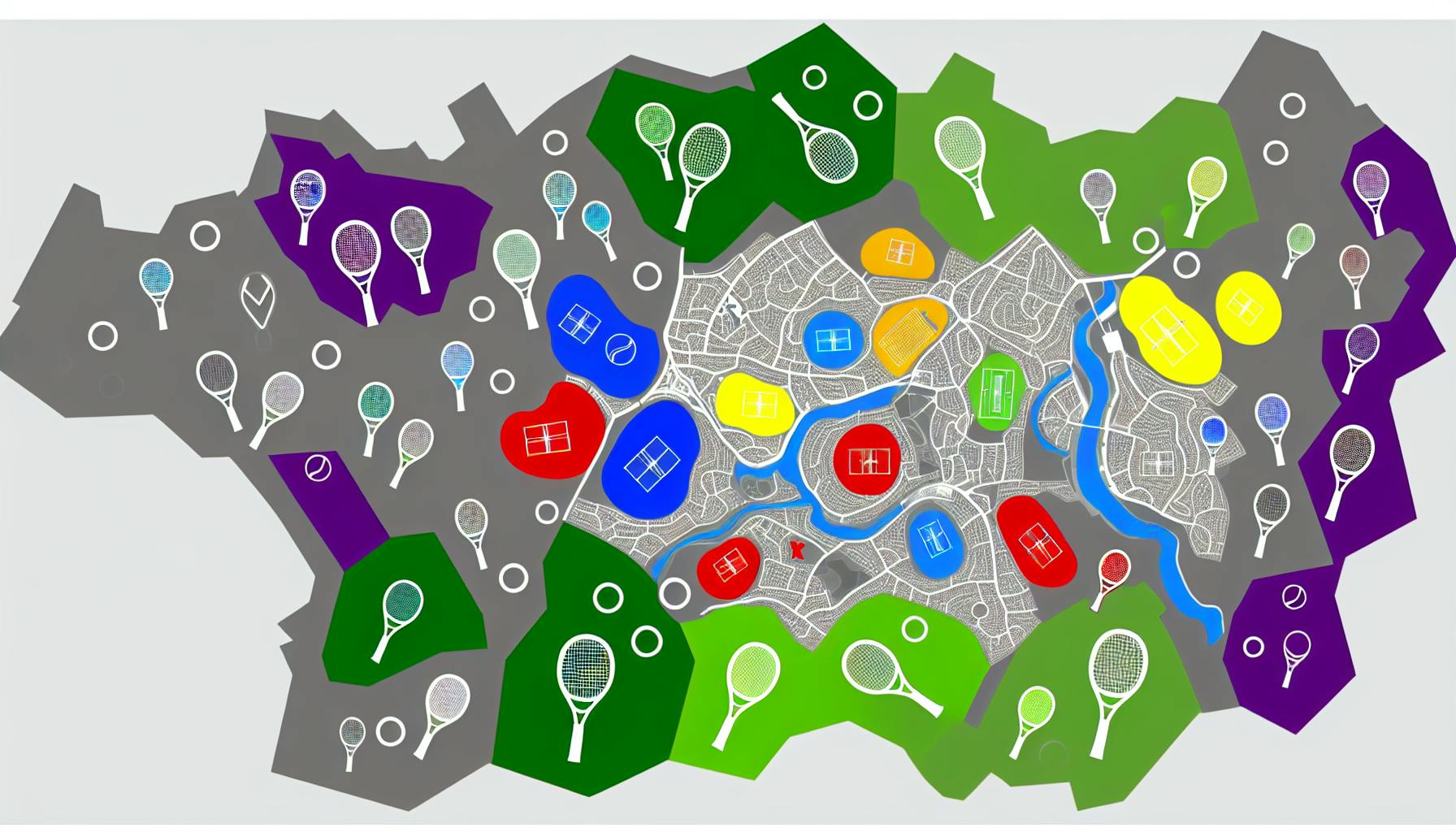Looking for eco-friendly padel clothing that performs well on the court and helps the planet? This guide highlights the top 10 sustainable padel apparel options, focusing on recycled materials, ethical production, and long-lasting design.
Key Picks:
- Ecoalf Recycled Nylon Skirt: Made from ocean waste, certified sustainable, and stylish.
- Adidas Parley Tennis Dress: Crafted with Parley Ocean Plastic, featuring moisture-wicking tech.
- Nike Victory Dri-FIT Dress: Uses 75% recycled polyester and keeps you dry with Dri-FIT tech.
- Viborace Performance Shorts: Durable and functional, made with recycled materials.
- Unidos Team-Ready Kit: Lightweight, moisture-wicking, and ethically produced.
- Pala Sports Forest Green Tee: Organic cotton and spandex blend, affordable and eco-conscious.
- Marc de Paw Color-Blocked T-Shirt: Removes ocean waste, breathable, and stylish.
- Patagonia Capilene® Cool Daily Hoodie: Recycled polyester, odor control, Fair Trade Certified™.
- Groceries Apparel High-Waist Leggings: Organic cotton with plant-based dyes, made in the USA.
- AYA Organic Pima Cotton Leggings: Fully biodegradable, soft, and durable.
Why Choose Sustainable Padel Clothing?
- Environmental Impact: Traditional apparel contributes 10% of global carbon emissions and 35% of ocean microplastics.
- Performance: Sustainable fabrics like recycled polyester and organic cotton are breathable, moisture-wicking, and durable.
- Ethical Practices: Brands ensure fair wages and safe working conditions.
Quick Comparison Table:
| Brand/Item | Key Material | Certifications | Price | Unique Feature |
|---|---|---|---|---|
| Ecoalf Skirt | Recycled nylon | GRS, B Corp | $75 | Made from ocean waste |
| Adidas Parley Dress | Recycled polyester | A.I.R. strategy | $100 | Parley Ocean Plastic |
| Nike Victory Dri-FIT Dress | 75% recycled polyester | Move to Zero | $85 | Dri-FIT moisture-wicking tech |
| Viborace Shorts | Recycled materials | None | $50 | Durable and functional |
| Unidos Team Kit | Renewable/recyclable | Ethical facilities | $120 | Lightweight and team-ready |
| Pala Sports Tee | Organic cotton, spandex | None | $42 | Affordable and eco-friendly |
| Marc de Paw T-Shirt | Recycled polyester | OCEANBALANCE | $60 | Removes 1.1 lbs of ocean waste |
| Patagonia Hoodie | Recycled polyester | Fair Trade Certified™ | $69 | Odor control and ethical production |
| Groceries Leggings | Organic cotton, spandex | GOTS | $78 | Plant-based dyes, made in the USA |
| AYA Leggings | Organic Pima cotton | GOTS, Biodegradable | $50 | Fully biodegradable materials |
Ultimate Padel Shorts
1. Ecoalf Recycled Nylon Padel Skirt
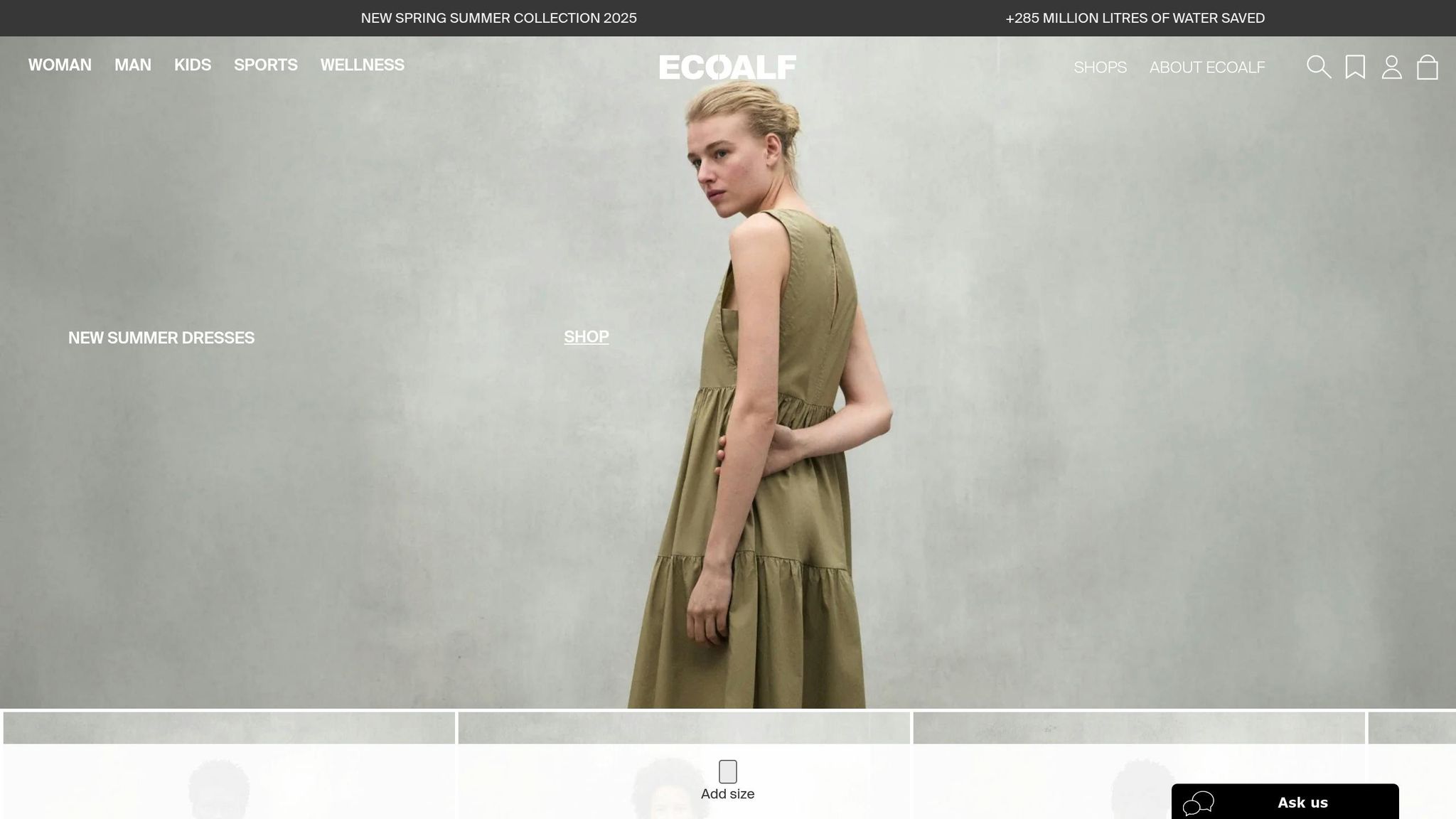
Ecoalf has made a name for itself with its recycled nylon padel skirt, blending sustainability with performance and style. This Spanish brand is turning ocean waste into high-quality sportswear, proving that eco-conscious fashion doesn’t have to sacrifice functionality.
Green Materials
This skirt is crafted from recycled nylon sourced from discarded ocean waste, showcasing Ecoalf’s dedication to minimizing its environmental footprint. By repurposing waste materials, the brand significantly reduces CO2 emissions and water usage compared to traditional nylon production methods.
Since its founding in 2009, Ecoalf has developed over 600 sustainable fabrics. In 2021 alone, 74% of the materials it used came from reclaimed waste, which saved 1,377 tons of CO2 and conserved 285 million liters of water.
"We are proud to use the least amount of natural resources possible (materials, energy, and transportation)." - ECOALF
These efforts are supported by certifications that validate the brand’s eco-friendly practices.
Certifications
Ecoalf’s sustainability claims are backed by respected industry certifications. The brand has held the Global Recycled Standard (GRS) certification since 2017, ensuring its materials meet strict recovery standards. It’s also Bluesign® certified and recognized as a Certified B Corporation, reflecting its dedication to both environmental and social responsibility.
In its FW20 collection, Ecoalf introduced 127 styles under the BCOME guarantee, which allows customers to track the environmental impact of each product.
Brand Transparency and Ethical Practices
Ecoalf goes beyond certifications by maintaining transparency throughout its supply chain and adhering to ethical production standards. As a Certified B Corporation, the company meets high benchmarks for social and environmental performance.
"I believe the time when fashion was just about looking good is over. More than ever it has to be about doing what is right and feeling good about it." - Javier Goyeneche, founder of Ecoalf
Ecoalf’s commitment extends to ocean conservation. In 2015, the brand launched its Foundation and the Upcycling the Oceans initiative, enlisting 3,200 fishermen to recover 700 tons of ocean waste and collecting an additional 500 tons from the Mediterranean.
Additionally, Ecoalf donates 10% of profits from its "Because There's No Planet B" collection to expand the Upcycling the Oceans project internationally. In 2023, the company introduced its first collection made entirely from recycled cotton, designed to promote circular fashion practices. With these initiatives, Ecoalf ensures that each padel skirt not only meets high sustainability standards but also delivers top-tier performance on the court.
2. Adidas Parley Tennis Dress

Adidas, teaming up with Parley for the Oceans, has turned ocean waste into performance-driven sportswear. The Parley Tennis Dress is a standout example of how a global athletic brand can address environmental issues while meeting the demands of padel players on the court.
Sustainable Materials
The Adidas Parley Tennis Dress is made from a blend of 75% recycled polyester and 25% elastane, with the recycled polyester sourced from Parley Ocean Plastic. This initiative collects plastic waste from beaches and coastal regions, tackling the growing problem of ocean pollution.
Adidas has made impressive progress in using recycled materials. By 2023, 99% of the brand’s polyester was recycled. Considering that only 15% of global polyester production uses recycled materials, this is a notable achievement. Adidas has set its sights on replacing virgin polyester with recycled alternatives in all possible products by the end of 2024.
To put the stakes into perspective, around 8 million metric tons of plastic waste enter the oceans every year. By 2019, Adidas had already produced nearly three million items using Parley Ocean Plastic, including jerseys for teams like Real Madrid, Bayern Munich, and Manchester United. These materials not only address environmental concerns but also ensure comfort and durability for athletes.
Performance-Driven Design
While its eco-friendly production is impressive, the Parley Tennis Dress doesn’t compromise on functionality. It features AEROREADY moisture-wicking technology to keep players comfortable during intense matches. The recycled polyester and elastane mix adds stretch and durability, allowing for ease of movement on the court. These practical benefits align with Adidas's commitment to ethical and transparent production.
Transparency and Ethical Commitments
Adidas’s collaboration with Parley for the Oceans is guided by the A.I.R. strategy - Avoid, Intercept, and Redesign - which focuses on addressing plastic pollution. The brand has set ambitious sustainability goals, including becoming carbon-neutral by 2050 and ensuring that 90% of its products are made with environmentally preferred materials by 2025.
Adidas also scored 128 points (51%) in the 2022 Fashion Transparency Index, reflecting its dedication to ethical practices. As a member of the Fair Labor Association (FLA), the company enforces strict standards for fair wages, reasonable working hours, and safe labor conditions. Additionally, Adidas has committed to diversity, aiming to fill at least 30% of new U.S. roles with Black and Latino candidates and to have women in 40% of management positions by 2025.
"We're committed to help end plastic waste and, by 2024, we'll replace virgin polyester in our products with recycled polyester wherever possible. To achieve these goals, we foster open-source partnerships and put a high value on collaboration over competition to create sustainable solutions that go beyond our own business and influence." – Shannon Morgan, Pacific senior director of brand at Adidas
3. Nike Victory Dri-FIT Dress
The Nike Victory Dri-FIT Dress blends high-performance features with a focus on sustainability, making it a smart choice for padel players who care about both their game and the planet. It combines Nike's moisture-wicking technology with environmentally conscious materials, offering a balance of comfort, function, and eco-awareness.
Eco-Friendly Materials
This dress is crafted with sustainability in mind, using at least 75% recycled polyester derived from plastic bottles. The main body fabric is a mix of 79% polyester and 21% spandex, while the ribbing incorporates 88% polyester and 12% spandex. By using recycled polyester, Nike reduces carbon emissions by up to 30% compared to virgin polyester production. On a larger scale, Nike diverts around 1 billion plastic bottles annually from landfills and waterways, turning waste into high-performance sportswear.
Performance-Driven Design
Built for movement and comfort, the Victory Dri-FIT Dress features Nike's Dri-FIT technology, which wicks sweat away from the skin, allowing it to evaporate faster. This keeps players dry and comfortable during intense matches. The dress also boasts ultra-stretch fabric, ribbed underarm panels for added flexibility, and a high neckline for extra coverage - ensuring unrestricted movement on the court. With a price tag of $85, it offers a premium feel without breaking the bank.
Commitment to Ethical Practices
Nike's "Move to Zero" initiative underscores the brand's dedication to reducing its environmental footprint. This program aims for zero carbon emissions and zero waste. By 2025, Nike plans to use 50% environmentally preferred materials in key product categories. The company also enforces strict supplier standards, conducting regular audits to ensure compliance with fair hiring practices, wages, and workplace safety.
Understanding that materials account for over 70% of a product’s environmental impact, Nike adheres to its Code of Conduct to maintain these standards. As a founding member of the Sustainable Apparel Coalition, Nike collaborates with industry peers to minimize environmental harm. Additionally, the Nike Grind program, launched in 1992, repurposes old shoes for recycling or donation, preventing them from ending up in landfills.
"MOVE TO ZERO IS NIKE'S JOURNEY TOWARD ZERO CARBON AND ZERO WASTE, HELPING TO PROTECT THE FUTURE OF SPORT." - Nike
4. Viborace Performance Padel Shorts

Viborace Performance Padel Shorts stand out as an excellent example of eco-conscious sportswear. Made from recycled materials, these shorts combine functionality with style, giving players the freedom to express themselves while meeting padel dress code requirements. Designed for durability and comfort, they hold up during even the most intense matches. By choosing these shorts, players not only prioritize their performance on the court but also contribute to more sustainable practices in sportswear.
5. Unidos Team-Ready Padel Kit
The Unidos Team-Ready Padel Kit blends high-performance features with a commitment to sustainability. Designed for padel enthusiasts who care about the planet, this kit proves that sportswear can be eco-conscious without sacrificing practicality or quality. The secret lies in its thoughtful materials and production methods.
Eco-Friendly Materials
Every piece in this kit is crafted using renewable and recyclable materials. By focusing on reducing waste and environmental impact, Unidos ensures their gear is not only durable on the court but also kinder to the planet.
Built for Performance
This kit isn’t just about sustainability - it’s built to perform. With excellent moisture-wicking properties and a lightweight feel, it allows for unrestricted movement, even during the most intense matches. Whether you're diving for a shot or playing through a marathon game, this gear keeps you comfortable and ready to perform.
Ethical Manufacturing
Unidos takes its commitment to ethical practices seriously. By working with certified facilities that uphold fair labor standards, they ensure every piece of gear is produced responsibly, aligning with their values of fairness and transparency.
6. Pala Sports Forest Green Tee
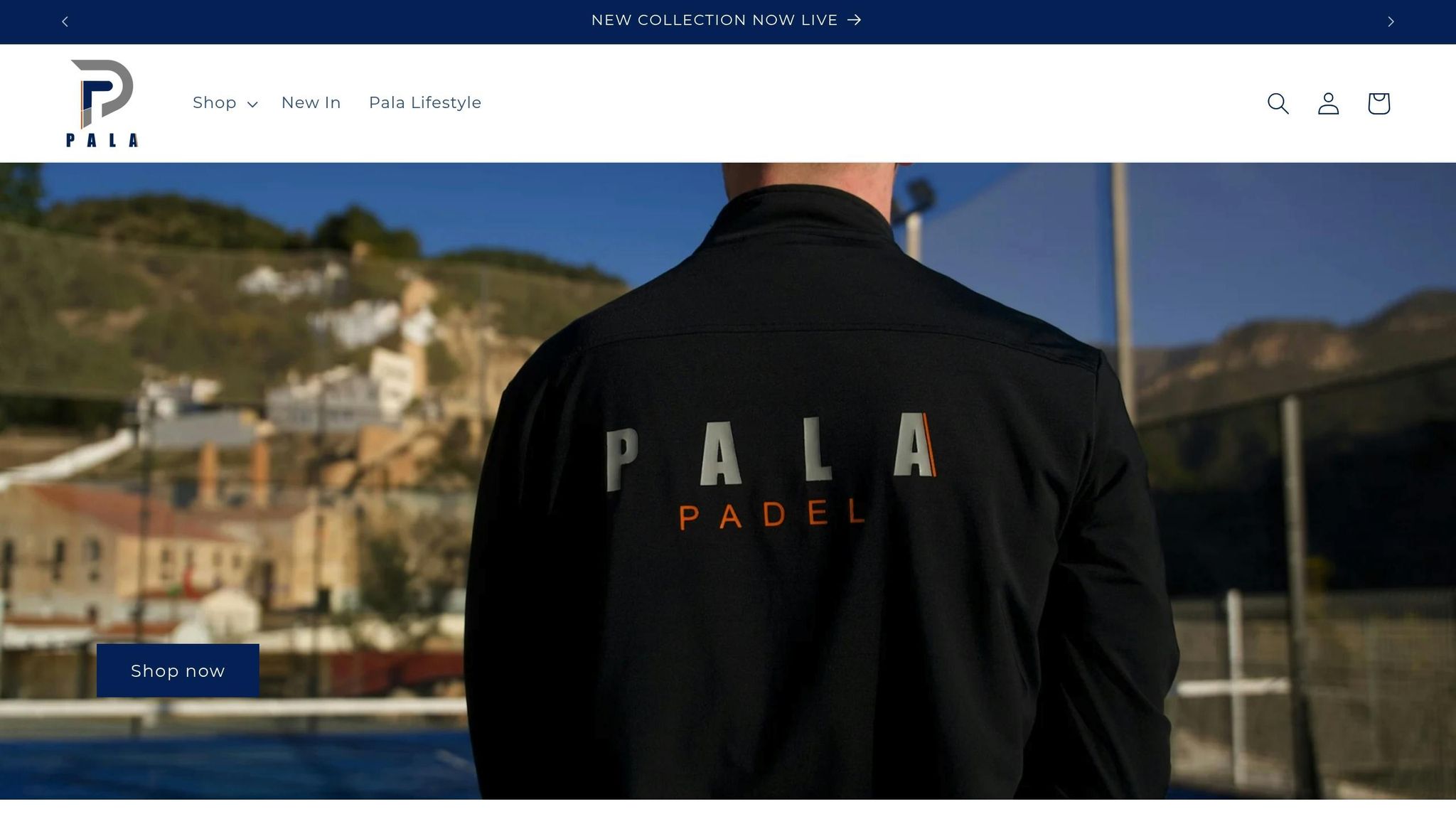
The Pala Sports Forest Green Tee combines eco-conscious design with performance, all for about $42. It’s a great example of how affordability and sustainability can go hand in hand.
Eco-Friendly Materials
This tee is crafted from a blend of 80% organic cotton and 20% spandex. The organic cotton reduces the use of harmful chemicals, while the spandex ensures the flexibility you need for active play. This mix not only makes it comfortable but also aligns with growing consumer demand - 70% of shoppers are looking for more responsible clothing options, and 66% are willing to pay extra for products that make a positive impact.
Like other standout options, the Forest Green Tee balances high performance with environmentally friendly production.
Ethical Practices and Giving Back
Pala Sports takes its ethical commitment seriously, donating 1% of profits to PadelAid, a program designed to support communities in need.
In short, the Forest Green Tee is a solid choice for players who want a stylish, comfortable option that also supports sustainability and ethical practices. It’s proof that you don’t have to compromise on performance to make a responsible choice.
sbb-itb-5591e69
7. Marc de Paw Color-Blocked T-Shirt
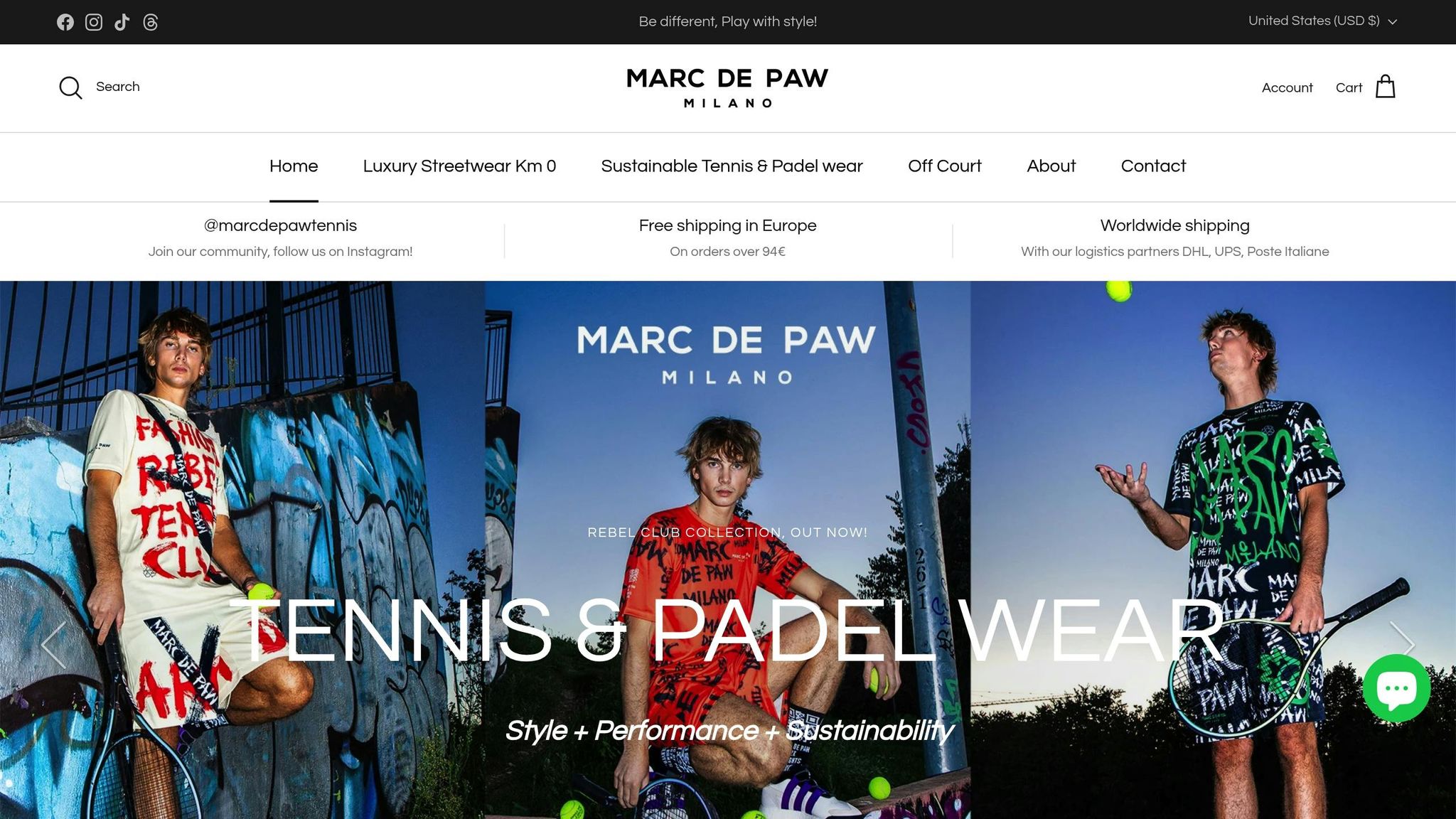
The Marc de Paw Color-Blocked T-Shirt is a lightweight, 135 gsm tee made from 100% recycled polyester. It’s crafted for padel players who care about performance and want to contribute to ocean conservation.
Eco-Friendly Materials
This t-shirt takes sustainability seriously with its use of OCEANBALANCE technology, which repurposes ocean waste into high-performance fabric. For every shirt produced, 1.1 pounds (0.5 kg) of plastic waste is removed from the ocean. Manufactured in Latvia, within the European Union, it benefits from shorter supply chains, cutting down on transportation emissions. Even the packaging aligns with its eco-conscious mission, arriving in a recycled paper bag instead of plastic.
Designed for Performance
Tailored specifically for padel players, this shirt combines lightweight, stretchy, and breathable fabric to keep you comfortable during intense matches. Its Dry Balance technology helps wick away moisture, while the athletic slim fit ensures unrestricted movement without extra bulk.
With its stylish color-blocked design, this t-shirt proves that you don’t have to sacrifice performance or aesthetics for sustainability. It’s a perfect example of how sportswear can be both functional and environmentally responsible.
8. Patagonia Capilene® Cool Daily Hoodie

The Patagonia Capilene® Cool Daily Hoodie is a standout choice for padel players who value both performance and sustainability. It’s a perfect example of how eco-conscious design can meet the demands of activewear without compromise.
Eco-Friendly Materials
Patagonia prioritizes sustainability in this hoodie by using recycled materials. The solid-colored sections are made from 3.7-ounce 100% recycled polyester jersey, while the heathered and cross-dyed options incorporate a 50% recycled polyester blend. By using recycled polyester, Patagonia reduces its dependence on virgin petroleum and keeps waste out of landfills.
Ethical Production Standards
This hoodie is made in a Fair Trade Certified™ facility, ensuring that workers receive fair wages and operate in safe working environments. Impressively, over 90% of Patagonia's products are crafted in Fair Trade Certified factories, positively impacting the lives of 85,000 workers worldwide. These ethical practices align seamlessly with the hoodie’s high-performance design.
Designed for Performance
The Capilene® Cool Daily Hoodie isn’t just about sustainability - it’s built for action. It features a moisture-wicking finish to keep you dry and HeiQ® Mint technology to control odor, ensuring comfort during intense games. The set-in sleeves provide excellent mobility, and the generous hood adds versatility. Minimal stitching further enhances comfort by reducing the risk of chafing.
Transparency and Ethical Leadership
Patagonia’s commitment to ethical practices and transparency sets it apart. The company openly shares its Annual Benefit Reports and offers detailed insights into its supply chain. As a founding member of the Fair Labor Association, Patagonia relies on third-party certifications to validate its sustainability efforts. Through its Fair Trade program, the brand pays premiums directly to factory workers, enabling them to invest in healthcare, childcare, or receive cash bonuses based on their community’s needs.
9. Groceries Apparel High-Waist Leggings

Groceries Apparel's High-Waist Leggings blend organic materials with transparent, local manufacturing practices. These leggings carve a niche in the padel clothing market by prioritizing eco-conscious design and ethical production. Let’s take a closer look at what makes them special.
Eco-Friendly Materials
Crafted from 92% organic cotton and 8% spandex, these leggings are dyed using a plant-based, non-toxic Vege-dye™ process. The thoughtful seam design on the front and back not only enhances the fit but also reduces fabric waste during production, combining style with sustainability.
Certified Organic Standards
These leggings carry the GOTS certification, a globally recognized standard that ensures the organic cotton used meets stringent environmental and social criteria throughout its production.
Designed for Performance
The fabric is breathable, lightweight, and stretchy, offering unrestricted movement while keeping you comfortable during high-energy games. The high-waist design adds both support and confidence, making them a reliable choice for activewear.
Ethical Manufacturing and Transparency
Groceries Apparel takes pride in its "Seed to Skin" approach, allowing customers to trace the journey of their fabric from the farm to the finished product. Every pair of leggings is made in their Downtown Los Angeles factory, ensuring safe working conditions, fair wages, and exceptional quality. They even offer factory tours to highlight their ethical practices.
At around $78.00, these leggings deliver premium sustainable activewear without sacrificing performance or ethics.
10. AYA Organic Pima Cotton Leggings
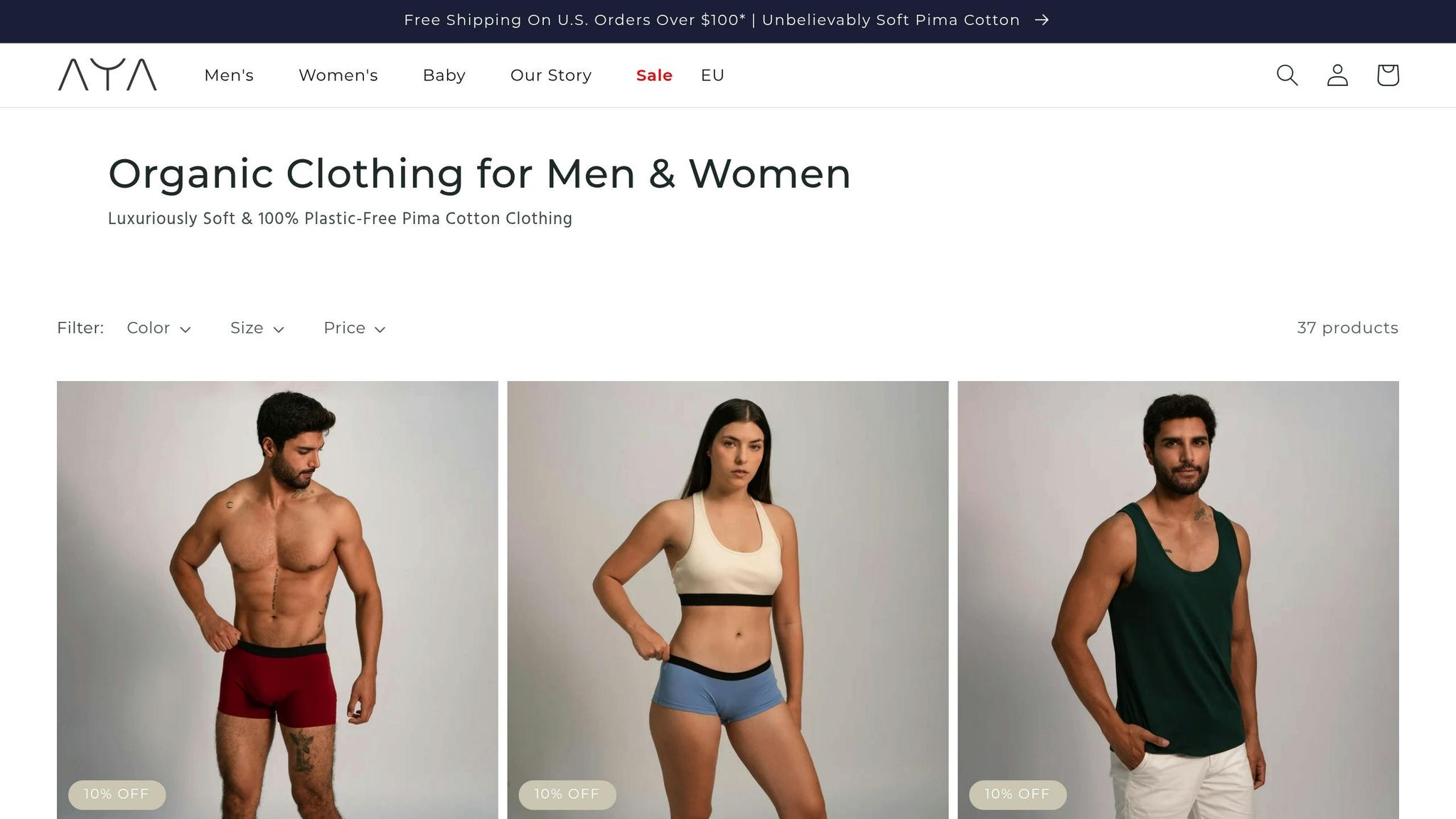
AYA's Organic Pima Cotton Leggings combine sustainability with comfort, offering a fully biodegradable option for eco-conscious padel players. Designed with care, these leggings prioritize natural materials without sacrificing durability or style.
Natural Materials, Thoughtfully Chosen
These leggings are made entirely from organic Pima cotton, grown without pesticides or harmful chemicals. Even the elastic bands are crafted from a blend of tree rubber and cotton, and the stitching uses only natural cotton threads. This means there are no synthetic components, making the leggings completely biodegradable. The fine fibers of Pima cotton give the leggings a soft, hypoallergenic texture while being tougher than most conventional options. To maintain their eco-friendly ethos, AYA uses low-impact, GOTS-certified dyes and OEKO-TEX-certified silicone finishing.
Recognized Certifications
AYA's leggings proudly carry a GOTS certification along with a 100% Biodegradable certification. These certifications reflect the brand's adherence to strict environmental and ethical standards. They serve as a testament to AYA's dedication to producing sustainable and responsibly made garments.
Ethical Manufacturing and Transparency
AYA takes full control of its production process by operating its own studio in Peru. This allows the brand to ensure sustainable practices, traceability, and fair working conditions. With a focus on using only biodegradable materials, AYA is committed to creating products that support a circular economy.
At $50.00, these leggings offer an affordable, eco-friendly choice for players who value sustainability. While they may not have the moisture-wicking properties of synthetic options, their natural breathability and hypoallergenic qualities make them a great pick for those prioritizing environmental impact.
Eco-Friendly Court Options
Pairing your sustainable padel clothing with eco-friendly courts takes your green commitment to the next level. Just like eco-conscious apparel, these courts are designed using practices that aim to reduce environmental impact.
Many of these venues incorporate recycled materials, such as rubber surfaces made from repurposed materials, and rely on energy-efficient LED lighting and water-saving systems to minimize their footprint. For example, a typical sports facility can consume 10 megawatts of electricity during an event - enough to power 10,000 households for a month. But forward-thinking venues are rewriting this narrative by adopting innovative sustainability practices.
"Embracing green initiatives not only enhances fans' game-day experiences but can also yield long-term operational cost savings and supports community development."
Water conservation is another key focus area. Advanced stormwater management systems are used to collect rainwater for irrigation and facility upkeep, helping reduce reliance on municipal water supplies. Additionally, many venues have implemented recycling programs that divert up to 75% of visitor-produced waste from landfills. These efforts align seamlessly with the eco-friendly choices you're making with your attire, creating a consistent approach to sustainability.
Renewable energy is also playing a larger role in sports facilities. Approximately 33% of major U.S. sports teams now use solar energy, with some venues operating entirely on renewable energy. These advancements set a new benchmark for sustainable sports infrastructure.
For players in the UK, Padel and Tennis Courts in the UK offers a valuable tool for finding venues that prioritize environmental responsibility. This directory connects eco-conscious players with facilities that align with their values, making it easier to find places that complement your sustainable clothing choices.
By combining sustainable gear - like apparel made from organic cotton, recycled polyester, or bamboo - with eco-friendly venues, you're supporting a holistic approach to environmental responsibility in padel. Together, these choices create a powerful synergy that extends well beyond the court.
"We are always looking for a sustainable venue. In the financial world it's a lot about trust, right? And we want the consumers to be able to trust us as a brand. We've seen in stats that with naming a venue, people tend to perceive a brand as very trustworthy." – Sebastian Ochs, head of global football partnership for Allianz
With 78% of U.S. consumers valuing a sustainable lifestyle and 73% of Gen Z shoppers willing to pay more for eco-friendly products, your choices in clothing and venues make you part of a growing movement that's reshaping the way we think about sustainable sports.
Care and Longevity Tips
Taking proper care of your sustainable padel clothing is key to making it last. Did you know that washing and drying clothes account for roughly 25% of a garment's total carbon footprint? Thoughtful garment care is just as important as choosing eco-friendly materials in the first place.
The golden rule for sustainable sportswear? Wash less and wash smarter. Your padel gear doesn’t need to hit the laundry after every session. If it’s not visibly dirty, air it out instead. This simple habit can extend your clothing’s life while reducing its environmental impact. For example, washing jeans every ten wears instead of every two can cut energy and water usage by 80%.
When it’s time to wash, pay attention to temperature and cycle settings. Hot water can break down dyes, cause shrinkage, and use up to 90% of a washing machine’s energy. Switching to shorter, colder cycles not only saves energy but also reduces microfiber release by 52%, which is especially important for preserving fabrics like recycled polyester and organic cotton.
Here are a few tips for washing your padel clothing effectively:
- Turn garments inside out to protect the fabric and ensure a thorough clean.
- Wash similar fabrics and colors together to prevent damage.
- Load your machine efficiently - full loads (but not overcrowded) are best.
Skip the fabric softener, as it can clog the fibers of activewear, reducing moisture-wicking and breathability. Instead, use eco-friendly detergents that are free from harsh chemicals. For stains, spot treat with a small amount of detergent rather than overloading your wash.
Drying Matters, Too
Air drying is the gentlest option for your clothes and the planet. In fact, it can reduce a household’s carbon footprint by up to 2,400 pounds annually. Steve Breckheimer, a Green America member, shares:
"Simply putting up a clothesline in the back yard and hanging out clothes to dry on a sunny day has reduced our electric bill, and the laundry smells fresh!"
If you must use a dryer, keep in mind that tumble drying can weaken sustainable fabrics - after just 20 cycles, some fabrics lose 50% of their strength. Whenever possible, hang your padel gear outdoors or use an indoor drying rack with a fan to speed up drying without compromising elasticity. For delicate fabrics like organic cotton or bamboo blends, lay them flat on a towel to dry, which helps maintain their shape.
Storage and Maintenance Tips
Proper storage can also extend the life of your padel clothing. Keep items in a dry, ventilated space and use natural-fiber bags for added protection. To ward off moths, skip the chemical mothballs and opt for natural alternatives like lavender sachets, cedarwood, or cloves. Need a quick refresh between wears? A light mist of water mixed with a few drops of essential oil can work wonders.
Finally, don’t underestimate the value of rotating and repairing your wardrobe. Rotating your clothes prevents overuse of your favorite pieces, while small repairs - like fixing a loose seam or replacing a button - can add years to their usability. In fact, extending the life of your clothing by just nine months can significantly lower its environmental impact.
Conclusion
Choosing eco-friendly padel apparel isn’t just about what you wear - it’s about shaping the future of the sportswear industry. By opting for sustainable gear, you’re aligning with a growing movement for change. In fact, 66% of all consumers - and an even higher 75% of millennials - factor sustainability into their purchasing decisions.
The numbers make it clear: the need for sustainable practices is urgent. The fashion industry contributes 10% of global carbon emissions and consumes more energy than both the aviation and shipping sectors combined. Traditional sportswear manufacturing continues to deplete resources, but consumer demand is pushing brands to rethink their practices.
Major companies are already making strides. Nike, for example, boosted its use of sustainable materials from 41% to 59% and has repurposed over 1 billion plastic bottles into yarn for jerseys and Flyknit shoes. Similarly, PUMA has cut paper use by 44% and reduced waste by 32% since 2010. The sustainable athleisure market is also on the rise, with projections reaching USD 142.61 billion by 2031, and 90% of Gen X consumers willing to pay a premium for sustainably made products .
As Nemanthie Kooragamage, Director of Group Sustainable Business at MAS Holdings, puts it:
"Activewear consumers want products that perform under pressure... but they also want to feel good about the impact their purchases have on the planet."
Sustainable padel apparel doesn’t just deliver on performance - it champions ethical and environmental responsibility. By choosing clothing made from organic cotton, recycled polyester, and renewable energy processes, you’re supporting fair labor practices and reducing harm to the planet. These choices also help combat the 500,000 tons of microplastics released into oceans every year from washing clothes. Every decision you make on the court can contribute to a cleaner, more responsible future.
FAQs
How do eco-friendly materials in padel clothing improve performance on the court?
Eco-friendly materials, such as recycled polyester and organic cotton, bring more to the table than sustainability - they're designed to enhance your performance. With features like breathability, moisture-wicking capabilities, and lightweight comfort, these fabrics help regulate your body temperature, keeping you cool and comfortable, even during high-intensity games.
Beyond that, these sustainable options tend to be softer on the skin and less likely to cause irritation. This extra comfort translates to better freedom of movement - perfect for those fast, agile plays on the court. By choosing sustainable clothing, you're not only making an environmentally conscious decision but also giving yourself an edge to perform at your peak.
What certifications guarantee that padel clothing is sustainable and ethically made?
To make sure your padel clothing aligns with sustainable and ethical practices, keep an eye out for trusted certifications. The GOTS (Global Organic Textile Standard) ensures that the textiles are crafted from organic fibers while adhering to rigorous environmental and social criteria. Similarly, the Oeko-Tex Standard 100 guarantees that the materials used are free from harmful substances, prioritizing safety for both you and the planet. Certifications like Fairtrade or B Corp also indicate that a brand is dedicated to fair labor practices and social accountability. These marks make it easier to choose clothing that values both people and the environment.
What’s the best way to care for sustainable padel clothing to keep it lasting longer and eco-friendly?
To keep your eco-conscious padel clothing in top condition and preserve its environmentally friendly qualities, try these simple care tips:
- Wash less frequently: Many garments don’t need to be washed after every wear. This saves water and reduces fabric wear.
- Stick to cold water: Washing with cold water helps prevent shrinking and fading while also conserving energy.
- Pick gentle, eco-safe detergents: These detergents are kinder to both your clothes and the planet. Avoid fabric softeners, as they often contain harsh chemicals.
- Air dry whenever you can: Forgo the dryer to prevent heat damage and help your clothing last longer.
Always take a moment to check the care labels for specific guidance. With these easy habits, your sustainable gear will stay in great shape for the long haul!
